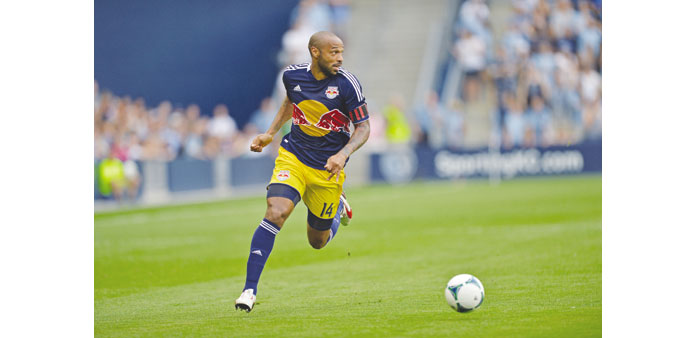Players like Thierry Henry who plays for MLS club New York Red Bulls have helped increase the popularity of football in USA.
The World Cup delivered a seductive sales pitch for soccer to the United States but marketing experts warn it remains to be seen just how many Americans have been sold on the sport enough to invest their time and money on Major League Soccer (MLS).
For nearly a month, Americans happily joined the World Cup party as soccer became the sport du jour, fans discussing Lionel Messi and the merit of penalty kicks with the same eagerness as they might more usually debate Derek Jeter and home runs.
But shortly after the US made their exit from the tournament at the hands of Belgium in the last 16, soccer slowly faded from the headlines.
By the time Germany had hoisted the World Cup on Sunday, most Americans had already moved on to the next big events on the sporting calendar - Major League Baseball’s Mid-Summer Classic and the British Open golf.
In an instant, the sporting conversation had shifted from Argentine Messi’s ranking among the all-time greats to Tiger Woods’s chances of claiming a 15th major title at Hoylake.
That reflects the view of experts, who say that the World Cup did not result in a seismic shift in American sporting tastes.
There was, they say, only another incremental increase in awareness of the “world game” with no inevitable dividend for the local professional league, Major League Soccer (MLS).
“People clearly got World Cup fever, we did well, it was exciting,” George Belch, marketing professor at San Diego State University, told Reuters.
“But we have to be realistic and realise that growth of soccer, particularly at the professional level, is going to be evolutionary not revolutionary.
“It’s growing, I think the MLS is making progress, it’s doing well, the league is expanding and these are all positive signs.
“But one can’t take the World Cup and say, ‘ok we’ve turned the corner and we’re not going to look back’.
“The fact is soon as the football games kickoff in college and pros, I don’t think we will be talking about soccer much.”
Soccer officials and supporters of the sport have rolled out a long list of impressive facts and figures that for them add up to one conclusion - soccer has arrived as a major sporting and entertainment force in the United States.
Once viewed as a soccer wasteland, the sport has been on an upward arc in North America for decades.
At the grassroots it has always been popular, with close to four million young American boys and girls playing in leagues from Maine to California.
NICHE SPORT
Often viewed as the outsider looking in, a niche league craving mainstream status, MLS has seen steady but unspectacular growth since it began in 1996.
The league has blossomed from 10 to 19 teams with new franchises in New York, Orlando and Atlanta set to come on line and plans for a club backed by England’s David Beckham in Miami.
In May, MLS announced a landmark television rights deal by signing an eight-year agreement with ESPN, FOX Sports and Univision Deportes that will, according to media reports, pour $720 million into league coffers.
At the same time, increasing numbers of soccer’s more recognisable names are considering their MLS options and the multi-million dollar deals available to designated players.
While Beckham’s days as an MLS missionary may have come to an end on the field, Englishman Jermain Defoe, Spaniard David Villa and Brazilians Kaka and Julio Cesar have just begun their North American adventures, joining Frenchman Thierry Henry, Australian Tim Cahill and Irishman Robbie Keane.
When television ratings for US World Cup games sky rocketed it was hailed as a clear sign that the United States had arrived as a soccer nation and finally embraced the beautiful game it had long kept at arms’ length.
Televised MLS matches, however, pull in only a small fraction of the viewers that tuned in to watch the World Cup in record numbers.
“MLS has methodically grown and it has done so in compelling markets and has been steady about it,” David Carter, the executive director of the University of Southern California’s Marshall Sports Business Institute, told Reuters.
“It is almost demeaning of Major League Soccer to have cast onto them the false promise of leveraging the World Cup to finally make soccer arrive in this country.
“Major League Soccer doesn’t think ‘oh my God’ all of a sudden we wave a wand and now the sport is ours for the taking in the United States.
“It (World Cup) is one of the building blocks but it requires a lot of building blocks along with time and patience.”

